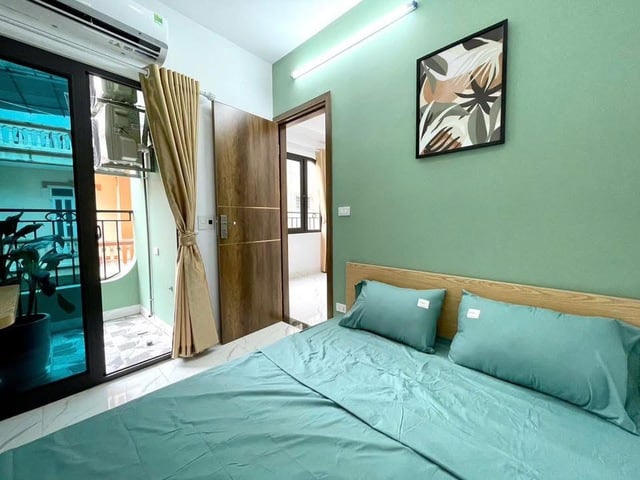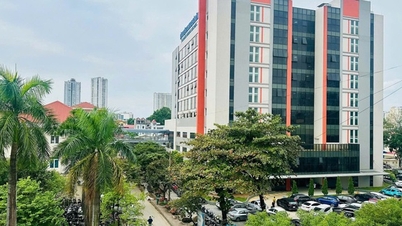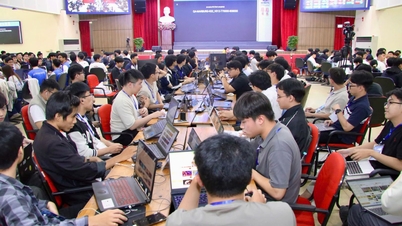Small rooms, high prices, expensive services
Since the beginning of September, many streets around major universities in Hanoi such as Nguyen Trai, Chua Lang, Cau Giay... have been packed with parents and students rushing around looking for a place to stay.
According to the annual rule, this is the time when room rental prices "escalate", creating an additional burden on the admission journey of new students.

A room for rent in the center of Cau Giay Ward costs 6 million VND/month.
PHOTO: PHUONG UYEN - HONG NGOC
Nguyen Minh Trang, a new student at Hanoi University, spent nearly a month looking for a room but was still not satisfied.
"There are rooms that are only about 15 square meters but cost up to 3.5 million VND/month, not including electricity and water. Private rooms are nicer but cost more than 4 million VND, beyond the family's ability. Some cheaper places are too far away, every day I have to take the bus for nearly an hour. I feel a lot of pressure because my parents are farmers in the countryside, the rent takes up most of the family's expenses," Trang shared.
In addition to the rent, Trang said, the accompanying service fees are also sky-high: electricity 4,000 - 4,500 VND/kWh, water 30,000 - 35,000 VND/m³, internet about 100,000 VND/month, cleaning 50,000 - 70,000 VND, parking 100,000 - 150,000 VND... Added together, the service fees alone amount to nearly 1 million VND/month.
Surveys in student-populated areas such as Cau Giay Ward and Hai Ba Trung Ward show that the price of a self-contained rental house currently ranges from 2.5 to 5 million VND/month. In areas close to the school gate, the rental price is up to 5 to 6 million VND/month, 500,000 to 1 million VND/month higher than last year. Compared to the average income in rural areas, this expense is a significant burden.

Flyer introducing boarding house posted near university in Thanh Xuan Ward
PHOTO: PHUONG UYEN - HONG NGOC
To reduce costs, many students are forced to choose to share a room. Nguyen Hong Hanh, a freshman at the University of Natural Sciences (Hanoi National University), rents a 25 m² room with two other students for 4.5 million VND/room/month. Each month, it is about 1.5 million VND/person, not including electricity and water. Sharing a room saves money but is also quite inconvenient.
"The small room that the three of us share is quite cramped, with clothes and belongings piled up. There are days when I want to study but it's hard to concentrate because one person needs to sleep, the other needs to make a phone call. But what can I do, because if I rent a separate room, it would cost 4-5 million VND per month, which is beyond my family's means," Hanh said.
Sharing a room helps to share finances but is really only a temporary solution. Living together in a small space can easily lead to conflicts, lack of privacy and directly affect the quality of study.
Supply cannot meet demand, so rents are harder to lower.
In the context of rising rental prices, dormitories are the choice of many new students because of their low cost and guaranteed security. However, the number of dormitories in Hanoi only meets a part of the actual demand.

Due to limited funds, Nguyen Hong Hanh shares a cramped room with two friends.
PHOTO: UYEN NGOC
In 2025, the Diplomatic Academy will recruit more than 2,200 students, but there are only 80 dormitories in buildings C and E (67 Chua Lang). Rooms are 57 m², fully furnished, rent is 1.3 - 2 million VND/month/person excluding electricity and water.
Hanoi National University welcomes more than 20,000 new students, but only has about 6,000 places to stay, of which about 1,700 are given priority for first year students. The university's three large dormitories in Me Tri, the Foreign Language University and My Dinh cannot meet all the demand. Thus, less than 10% of new students have the opportunity to stay in the dormitories, the rest have to rent outside at high costs.
The cost of staying in a dormitory is only 200,000 - 600,000 VND/month, much cheaper than private accommodation. However, sharing a room with 4 - 8 people is inconvenient, especially for students who need a quiet study space. Some schools have introduced students to reputable accommodation through applications, such as the OneVNU app, but this is only a temporary solution and cannot completely solve the accommodation needs of students.
Meanwhile, the outside rental market is almost "free-floating". Rent, electricity, water and service prices are all decided by the landlord. During the school year, the demand increases sharply, causing the supply-demand balance to tilt in favor of the landlord.
Ms. Nguyen Thi Hong, owner of a boarding house near Hanoi University, explained: "Electricity, water, and sanitation bills are all higher. If they don't increase, we won't be able to afford it. In early September, every room was booked as soon as the ad was posted. Sometimes, a room was paid for this morning and someone had already paid a deposit this afternoon. Therefore, keeping the same price as last year is almost impossible."
Housing difficulties not only affect the family economy but also directly affect the psychology and quality of study. To solve the housing problem, we cannot rely only on the individual efforts of students and their families. Expanding the dormitory system, making electricity and water prices transparent, and encouraging the development of low-cost, stable-quality boarding houses are things that need to be taken into account.
Accommodation is an essential need associated with the learning journey of future graduates. A long-term, synchronous strategy from the State, schools and society is needed so that the journey to university of each young person begins with peace of mind, instead of struggling with the problem of accommodation from the first days of enrollment.
Source: https://thanhnien.vn/tan-sinh-vien-chat-vat-tim-nha-tro-giua-ha-noi-dat-do-18525010107571989.htm




![[Photo] Cutting hills to make way for people to travel on route 14E that suffered landslides](https://vphoto.vietnam.vn/thumb/1200x675/vietnam/resource/IMAGE/2025/11/08/1762599969318_ndo_br_thiet-ke-chua-co-ten-2025-11-08t154639923-png.webp)














![[Video] University of Foreign Languages - Vietnam National University, Hanoi received the First Class Labor Medal](https://vphoto.vietnam.vn/thumb/402x226/vietnam/resource/IMAGE/2025/11/08/1762614378165_gen-h-z7203450341291-b1f427bb0cccc706a5bcc4b985f90a70-7234-jpg.webp)

























![[Video] Hue Monuments reopen to welcome visitors](https://vphoto.vietnam.vn/thumb/402x226/vietnam/resource/IMAGE/2025/11/05/1762301089171_dung01-05-43-09still013-jpg.webp)































































Comment (0)